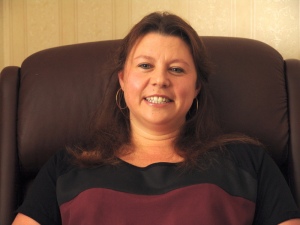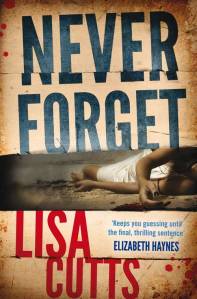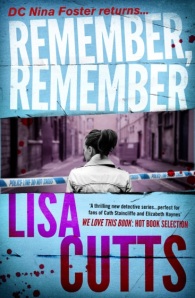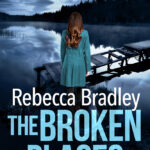Sitting in the first draft hot seat today is crime writer, Lisa Cutts.
 Lisa Cutts is an award winning, Kent based crime author and is signed to Myriad Editions for two novels, the first of which is titled ‘Never Forget’ and is available in paperback and for e-book readers.
Lisa Cutts is an award winning, Kent based crime author and is signed to Myriad Editions for two novels, the first of which is titled ‘Never Forget’ and is available in paperback and for e-book readers.
Lisa, 42, married Graham in 2000 and moved from South East London to Kent in 2008. They live with their labrador, LG, and Lisa is also step-mum to a daughter and two sons, together with five step-grandchildren.
Writing is Lisa’s passion, and dedicates her time to the Nina Foster series. She also has a keen interest in social events such as the theatre, pubs and walking in the countryside, discovering new places in the South East to enjoy.
As both a fan and reader of the detective genre, her first novel follows a brutal murder case with a new twist, giving the reader a unique insight and perspective into the heart of the investigation itself – the Police Major Incident Room.
Drawing from her own experience over many years as a serving police officer, and that of friends, family and colleagues, Lisa is able to combine first hand experience with her own imagination and writing, resulting in a compelling journey through the most devastating of crimes
In 2012, Lisa was announced as the winner of the Myriad Editions Writers Retreat Competition and ‘Never Forget’ has been received to critical acclaim.
When you decide to write something new, what is the first thing you do?
Once I’ve had an initial idea of what I’m going to write about, I find the best approach is to sit down and do it. Lack of planning has often caused problems but starting is often the most difficult part. If I don’t make time to begin with, it will never happen. I spend some time thinking over a rough idea but I don’t plan very much on paper before I tackle something new.
 Do you have a set routine approaching it?
Do you have a set routine approaching it?
When I started writing my debut novel, Never Forget, I was so enthusiastic, I started writing and thought I would see how it developed. I started my second novel about one week after finishing the first draft of Never Forget in another fit of enthusiasm. Similar to a lot of writers, I also work full-time, so finding time for anything else can be a little difficult. About the only routine I have so far, is that I have to seize the opportunity when it comes along.
Pen and paper or straight to the keyboard?
I write in a notepad for the first four or five pages and then I swap over to the keyboard. I find writing by hand oddly comforting but recognise that it’s hugely impractical.
How important is research to you?
Making sure the factual aspects of fiction are accurate is something I think is crucial if I’m expecting a reader to believe in the story. The police procedural novels I’ve written are based upon eighteen years of police work, even though the characters are a complete work of fiction.
How do you go about researching?
Apart from drawing on my experience as a Detective Constable, I’m approaching friends and colleagues for contacts in the medical profession, Probation Service, Prison Service, Fire Service and Royal Marines. So far, everyone has been willing to help and I’m very grateful for that.
How do you store everything; ideas, research, images that catch your eye?
I print articles from the internet and store magazine and newspaper articles that interest me, as well as keeping notes and emails from those I’ve corresponded with for their expertise.
Tell us how that first draft takes shape?
It’s a matter of forcing myself to keep going until I think that the story is told and I’ve answered any points that need to be resolved. I’m a great one for scribbling lists and making handwritten notes and crossing them off as I cover them. One thing I love to do is to leave it at a point where I’ve no idea what is going to happen next, forcing me to come up with ideas when I next sit down to work on the draft. Either that or I’m wasting time staring at my last word and a cursor.
Are there any rituals you have to do or items you must have with you while writing that draft?
A glass of wine always goes down well during any draft.
Does the outside world exist or are you lost to us for a period of time as the magic works?
I’m distracted very easily and I’m very nosy. I usually sit by the window to write and will stop work to look out at every opportunity. My Labrador often tries to climb on my lap too and the slightest thing will stop me writing. Then I feel under pressure as the hours rush by, but it still doesn’t stop me wondering where my neighbours have been or what’s going on in the street.
What does your work space look like?
I mainly write in our spare bedroom. I prefer to be out of everyone else’s way and take over the whole room with piles of papers, notebooks and pens around the computer.
Edit as you go or just keep getting words out?
Keep going was about the best advice I’ve been given but if I know that something’s not right, I can’t go on without changing it. I don’t reflect too much until I’ve had a read through of the entire thing but as I worry a lot about the accuracy of the police procedures, if I think something isn’t correct, I won’t rest until I’ve put it right.
I see many writers counting words in a day. Word counter or other method of keeping track of progression?
For me, it’s about putting time in. Having said that, I do mark hours well spent by how many words I’ve managed, although I rarely set myself a target.
So, that first draft is down. Roughly how long did it take? And what shape is it  in?
in?
Never Forget took six months. Remember, Remember took eighteen months. The difference was I was writing Remember, Remember while editing Never Forget, plus attending events I was lucky enough to be invited to. I’d like to think that the extra time spent also meant that the first draft was much improved, but my editor may disagree.
In what format do you like to read it through, ereader, paper or the computer screen?
Paper is my favourite format but the most wasteful. Ereader is useful as it’s so portable but the first read through is usually the computer screen.
What happens now that first draft is done?
I ask my husband to read it. He doesn’t read much fiction but he’s always a very honest critic. Once I’ve incorporated his comments, I forward it to my editor. Truth be told, I don’t even like her seeing it at this stage, but she would be amazing if she managed to edit it without reading it.
Thanks for digging into the depths of the first draft. It’s been a pleasure having you.
You can find Lisa on her website, Twitter and Amazon.
If you’ve enjoyed the answers on Lisa’s first draft process, you can find the previous Q&A’s from other authors in the series Here.
To be a part of the First Draft series, just get in touch and let me know. Along with the answers to the questions, I’ll need a profile photograph, a first draft photograph and any photo’s you feel are relevant to the piece, including book cover photo’s and three links that you feel are your most important.
Due to the fact that I am engaging in the A to Z Challenge in April, the First Draft series will take a break for the month, but please still get in touch and we can sort out the articles and book them in as they are returned.





Hi Lisa, thanks for the interesting facts! I am equally amazed by the fact that your handwriting is legible enough to allow you to write out the first several pages, and that I haven’t read your books! Obviously that is now on my to do list (the reading, not handwriting legibly). Rebecca, I forgot all about the A-Z challenge, think I’ll do it again this year too – it’s not like I have anything else to do.
Thanks so much to Rebecca for the invitation to be on her blog and for your responses.
Dear DJ, I write a vast amount of statements by hand at work, so my writing isn’t too bad – although others that read them may not share that view!
Marina, good to meet you too. I can’t deny it would be nice to write full-time. Hopefully, one day.
Thanks too Margot and Carol for your comments.
Kind regards to all, Lisa
Hello, Lisa, pleased to meet you. It must be so interesting incorporating your work into your fiction – but do you ever wish that you could leave the work behind? Busman’s holiday and all that… I always like a good police procedural, so this is now most definitely on my reading list!
Rebecca – Thanks for introducing us to Lisa.
Lisa – Thanks for sharing how you go about getting your first draft written. I agree with you completely that research is an important part of a solidly-written book. And you’ve got such a good solid background on which to draw as you write! I wish you much success.
This was a very insightful interview, Rebecca. I’ll keep looking for this first draft series and will come back to read others:)
I particularly liked what Lisa said about storing her research material. That’s often a problem with me…I come across so much interesting material and then forget where I read it 🙂
OK, Lisa, you promised ‘piles of papers and pens’ and your writing area looks so organized! Really—I’m quite jealous.
I love your tidy workspace, mine is all over the place, with my Macbook on the sofa, kitchen table, in bed at midnight and sometimes if the kids are particularly noisy, sitting outside in my car. 🙂
I never admit to having a first draft – and the thought of anyone seeing it gives me a cold sweat. I’m roughly 4 drafts in before I announce it’s at first draft stage 🙂